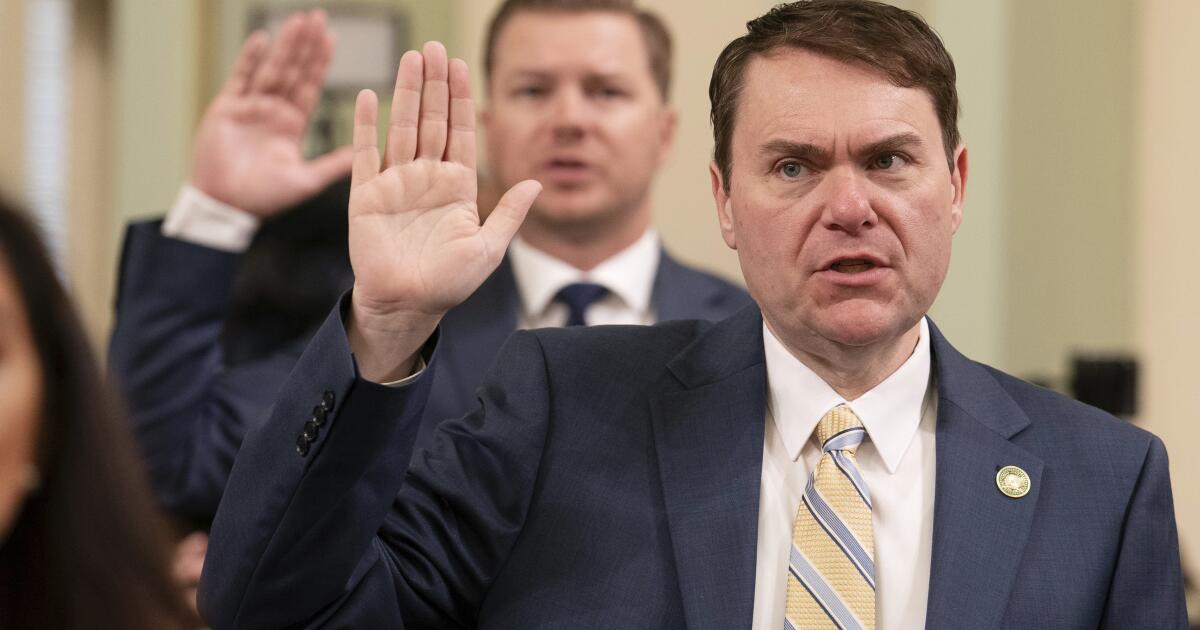Sacramento Democrats show their arrogance hazing GOP lawmaker
There are plenty of reasons to dislike Carl DeMaio, if you so choose.
The first-term San Diego assembly member is MAGA to his marrow, bringing Donald Trump’s noxious politics and personal approach to Sacramento. For Democrats, the mere mention of his name has the same effect as nails applied to a chalkboard.
Fellow Republicans aren’t too fond of DeMaio, either.
Party leaders worked strenuously — and far from successfully — to keep DeMaio from being elected last fall. They accused him of criminal wrongdoing. Allies spent millions of dollars to boost his GOP rival.
Republican foes “cite his relentless self-promotion, his criticism of his party and his tendency to take credit for victories he played little or no part in to help him fundraise and elevate his political brand,” CalMatters wrote in a harsh January profile.
None of that, however, excuses the silly and juvenile behavior of the Assembly’s majority Democrats last week when the chamber took up a resolution commemorating Pride month.
DeMaio, the Assembly’s first openly gay Republican member, rose on the floor to voice his objections. Usually lawmakers have around five minutes to offer their remarks without interruption.
Not this time.
DeMaio complained that the resolution — larded with more than three dozen whereas-es — strayed far afield from a straightforward commendation, endorsing some “very controversial and extremist positions” opposed even by members of the LGBQT+ community.
“This is not about affirming the LGBT community,” DeMaio said. “It’s about using them as a political pawn to divide us.”
You can agree or disagree with DeMaio. You can embrace the resolution and its myriad clauses with all your heart, or not. That’s beside the point.
About 90 seconds into his remarks, DeMaio was interrupted by the Assembly member presiding over the debate, Democrat Josh Lowenthal of Long Beach, who said he had a “very important announcement” to make.
And what was the pressing matter that couldn’t possibly wait a second longer? Wishing another Assembly Democrat a happy birthday.
Cheers and applause filled the chamber.
DeMaio resumed, only to be interrupted a short time later. Lowenthal deadpanned that he’d forgotten: It had been another Democratic lawmaker’s birthday just a few days earlier. More cheers and applause.
DeMaio resumed and then was interrupted a third time, so Lowenthal could wish “a very, very happy birthday” to a third Democratic Assembly member, who was marking the occasion the next day.
The response in the chamber, laughter mixed with more whoops and cheers, suggested the hazing by Lowenthal and fellow Democrats was great good fun and oh-so-clever.
It wasn’t.
It was petty. It was stupid.
And it bespoke the arrogance of a super-majority party too used to having its way and bulldozing Sacramento’s greatly outnumbered Republicans.
A few things are worth noting here, seeing as how California is supposed to be governed by a representative democracy.
DeMaio’s political peers may not be terribly enamored of the freshman lawmaker. But he was the clear-cut favorite of voters in San Diego, who sent him to the Assembly by a whopping 57% to 43% margin. Their views and voices deserve to be heard.
Democrats may be California’s majority party, enjoying a sizable registration advantage. They hold 60 of 80 seats in the Assembly and 30 of 40 in the state Senate. But the state has nearly 6 million registered Republicans. There are doubtless many more in California who support the party, or at least its policies and broad philosophy, but choose not to formally affiliate with the GOP.
They, too, deserve to be heard.
A not-insignificant number of California residents feel overlooked, ignored and unrepresented by Democrats and their hegemonic rule over Sacramento. The frustration helped spawn the fruitless and wasteful 2021 attempt to recall Gov. Gavin Newsom — which cost taxpayers more than $200 million — and fuels the perennial fantasy of a breakaway rural state called Jefferson.
To a larger point: One-party rule is not good for California.
“When you’re competing, you’ve got to be sort of on your toes,” said Thad Kousser, a UC San Diego political science professor who’s researched the difference between states with two vibrant political parties and those ruled by one or the other.
“When you’re solidly in control, you don’t feel like you need to prove it to voters,” Kousser went on. “You can write off certain areas of the state. You can ignore legislators in the other party, because you don’t think the shoe will ever be on the other foot.
“None of that,” Kousser concluded, “is good for democracy.”
It’s been well over a decade since Gov. Arnold Schwarzenegger left office and Republicans wielded meaningful clout in Sacramento. The last time the GOP controlled the Assembly was when Bill Clinton was in the White House. Gerald Ford was president the last time Republicans had a majority in the state Senate.
That’s not likely to change anytime soon.
In the meantime, Democrats don’t have to love their fellow lawmakers. They don’t even have to like them. But at the very least, Republicans elected to serve in Sacramento should be treated with respect.
Their constituents deserve as much.


